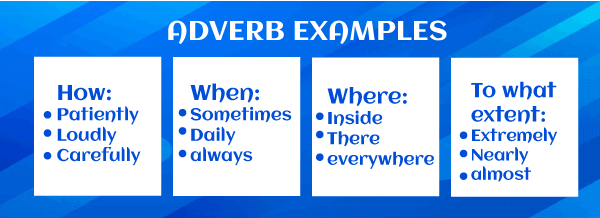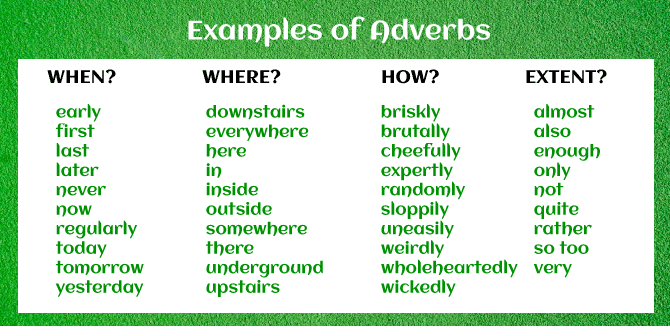Adverb Examples
Adverbs can be challenging for writers since they serve a range of purposes in the English language. One can include more description, define the actions, or enhance the meaning of other words with the help of a few adverbs. Examining instances of adverbs and adverb phrases will help you determine and successfully employ this component of speech.

Adverbs are used to change the verb, adjective, and other adverb. They have the ability to add to or alter the meaning of a word. Looking for words that finish in -ly is a wonderful approach to spot adverbs.
Thus, adverbs are terms that define the verbs, adjectives, another adverbs, or sentences and are frequently employed to demonstrate timing, manner, location, or degree.
When an adverb changes a verb, it informs us how, when, where, why, frequently, or in what amount the activity is performed. Here are a few adverb examples that modify verbs:
- How he jumped: They jumped quickly
- When he drove: He drove yesterday.
- Where he raced: He raced here.
- How frequently or often: John ran daily.
- How much: Johnny danced the fasted.
Consider the following adverb examples:
- Abruptly: The movie clip seemed to end abruptly.
- Beautifully: The beautifully decorated room is a wonderful addition to our house.
- Delicately: Granny's crystal jar is an invaluable antique that must be handled delicately.
- Delightfully: Her attire reflected her delightfully quirky nature.
- Firmly: The educator firmly instructed the pupils for their misconduct.
- Lightly: While serving, she lightly sprinkled the cupcakes with icing sugar.
- Truthfully: She truthfully responded to the authorities' questions.
- Quickly: Wrap up the grocery shopping as soon as possible so that we may arrive at the party on time.
- Wearily: After a tiring day, Helen wearily approached the bed.
- Willfully: I sent my child to bedtime for willfully denying to eat his fruit and veggies.

Adverbs Explain How It Happened
Adverbs belong to the expressive language class since they describe how something occurred. Here are a few adverb examples for better understanding.
- Briskly: Christine briskly walked to the reading room, keen to finish her schoolwork.
- Brutally: It was brutally evident he was not eager to hear my point of view.
- Cheerfully: February cheerfully welcomed us with pleasant weather.
- Expertly: Adie expertly navigated the elements of the system into their correct positions
- Randomly: I really like to randomly share fascinating videos and messages with my friends.
- Messily: He writes messily, yet he believes his thoughts are more vital than his handwriting.
- Nervously: Jemma exhaled nervously, knowing that the gloomy sky was a warning of an approaching rainstorm.
- Strangely: She performs strangely, but it's her unique nature that I find most endearing.
- Wholeheartedly: I wholeheartedly feel education is vital for a thriving future.
- Wickedly: He looked at me in a wicked manner.
Adverbs Tell Where It Happens
Certain adverb specifies where or the location an action takes place. Here are some adverb examples for comprehensive understanding.
- Downstairs: The school team often holds discussion meets downstairs.
- Everywhere: John looked everywhere for his missing pens
- Here: She intends to grow vegetables here.
- In: We stayed in to watch films rather than attending the celebration.
- Inside: She likes to study inside when it's warm and humid outside.
- Outside: The kids enjoy playing outside.
- Somewhere: I want to go boating somewhere warm and sunny.
- There: We traveled to Minneapolis for my sister's wedding and spent three days there.
- Underground: The rodents started digging underground.
- Upstairs: I ran upstairs to see my grandmother, who was unwell.
Adverbs Explain When It Happened
Adverbs of this type usually specify when an action took place.
Here are a few adverb examples for better understanding.
- Early: She showed up early for the gathering.
- First: When I bake, I make muffins first.
- Last: When I wash, I do daily chores last.
- Later: I'll come back later to see how you're doing.
- Never: He has never expressed an interest in accompanying me to the park.
- Now: The film is about to begin now.
- Regularly: Writing regularly in my diary is relaxing.
- Today: I have a lot to get done today.
- Tomorrow: We're going to the cinema tomorrow.
- Yesterday: She paid us a visit yesterday.

Adverbs Indicate the Extent of the Action
Adverbs can also be used to define the extent to which something was accomplished. Here are a few adverb examples for better understanding.
- Almost: I almost stalled at Kfc for lunch, but I was running behind schedule.
- Also: A good singer, Jon also loves playing musical instruments.
- Enough: Danny is now tall enough to experience the rollercoaster ride.
- Only: I only take public transport to work on Monday and Tuesday.
- Not: John is not running that cup race.
- Quite: I was quite happy to see my child's educational progress this year.
- Rather: I am rather weary after spending the entire afternoon at the beachline.
- So: I'm so thirsty that I'd drink lemonade
- Too: It is too loud for me to focus.
- Very: Baby Sarah was very exhausted after missing her sleep last night
Adverbs Increase Intensity
Adverbs also have the role of emphasizing the meaning of the term they modify. It accomplishes this by emphasizing more or emphasizing less on the term, stressing its meaning, or toning down the emotion of the phrase.
Here are a few adverb examples of sentences using the accentuating adverb in bold:
- He literallycrashed his scooter.
- I am aware of the exact factual information. For sure.You simply do not realize.
- I reallydon't give a damn of what you think.
Sentences that magnify are as follows: The adverb examples have been highlighted for easy recognition.
- She completelydismissed his idea and concept.
- I wholeheartedlysupported the food business.
- He totallyenjoys being with me.
- I absolutelydeny residing here any longer.
Adverbs and adverb phrases that reduce the intensity of a sensation or mood include: The adverb examples have been highlighted for easy recognition.
- Individuals can work on improving on this to some extent.
- The supervisor almostresigned from his position after that.
- I somewhat know what you're saying.
- She mildlydismissed his behavior.
Adverb Phrases
Adverb phrases act similarly to adverbs in that they alter a verb or adjective. They supplement a statement by notifying us when, how, where, and to what extent. Adverb phrases can begin with prepositions or the infinitive form of verbs and often do not include an adverb.
Here's a collection of Adverb examples in the sentences that include the adverb phrase in bold. They have been highlighted for easy recognition.
- John lived in the north of Europe.
- We went out yesterday to buy a new vehicle.
- Helen goes to the films and shows every week.
- Elizabeth got me laughing wildly and uproariously.
- I piled the publications where the teenagers can reach them.
- She tried to look for dandelions yesterday afternoon.
- He travels so slowlyin the early hours.
- He went to sleep much later than usual.
- Kindly stay for as long as possible.
- We cheered clapped crazily to support the players.
How to Use Adverbs Effectively
In the realm of grammar, an adverb or adverb phrase is a workhorse, modifying and strengthening the meaning of the associated verbs, adjectives, or adverbs. While you may employ many adverbs, you risk that your reader will be alienated with complex, hard-to-read text. Adverbs, on the other hand, should be used accordingly.
Adverb Examples in Sentences
Here are some more examples of Adverbs in Sentences. Let us understand adverbs with the help of sentence examples;
Adverbs have been highlighted for your ease of recognition
Let's first begin with adverbs of manner.
- The new employee accidentally destroyed everything from the shared disk.
- The seventh-grader awkwardly stood for a hug from his peer.
- I am speechless at how beautifully she designed the play's setting.
- In the cover letter, briefly discuss your job expertise.
- He was able to see clearly for the first time in his life after getting spectacles.
- I admire you dearly regardless of our two decades together.
- She reached her hands enthusiastically into the snack jar.
- The author foolishly neglected to back up his script, and the energy supply went out.
- She screamed jealously at the woman who was flirting with her husband.
- The girl approached the stage anxiously and started singing.
- If you are unable to fold the sheets correctly, skip it then.
- The individual who received the phone aggressively told me that my RV was way too old to stay and then he hung up.
- The newcomer timidly took a place near the far end of the group.
- After the race, we joyfully had a massive brunch.
Here are a few instances of adverbs of place
- The children like to go playing on the swings in the backward.
- For tale time, the baby snuggled close to his mother.
- Can you shift down a few spots to make space for us?
- After going to college in California, he relocated back east.
- We looked everywhere for my misplaced wallet, but couldn't find it anywhere.
- She simply came here from outside of the city.
- I wish my most cherished friend still resided nearby.
- Please go outside if you are going to make noise!
- Did you check over there for wedding bangles?
- The thrill ride journeyed upward at almost 90 degrees of angle.
Next, let us take a closer look at some adverbs of frequency.
- On Christmas Eve, we always have a party
- My employer conducts performance evaluations bi-annually.
- He regularly misses his way out because he is engrossed in an interesting audiobook.
- My grandparents generally spend their free time with their buddies.
- Do you receive wages on an hourly basis?
- I pray you never have experience anything horrible.
- Occasionally, they like to spend on good clothes and lavish meals.
- So, do you visit here often?
- The instructor rarely grins at her pupils.
- The news seldom offers the entire narrative of what occurred.
- On Tuesdays, I typically have an interview at 10 a.m.
- Is he usually so late, or is this unusual for him?
Following this are adverbs of purpose. These function similarly to conjunctions but explain why something occurred.
- The sandwich is bad. In fact, it's one of the most disgusting meals I've ever consumed.
- In order to leave an excellent first impression, I got up very early to do my hair and make-up.
- We were a few points down in the fourth term, nonetheless we gave it our all to win.
- Since it is getting chilly outdoors, I've put all of my jeans and tank tops away.
- The commuter train was running behind schedule; thus, I was unable to buy coffee.
Here are a few instances of adverbs of time:
- We will go to the cinema after we finish our lunch.
- The entire family went on holiday to Miami last year.
- Do you wish to go fishing with me later?
- Our manager expects everyone to receive a substantial bonus next year because we exceeded our annual goals.
- I recently saw a fantastic production of the operas La Traviatta.
- My phone is definitely somewhere in my living room, but where?
Let's now look at a few instances of adverbs of degree, which describe the intensity of an event.
- That stupid magic gimmick almost tricked me!
- Despite the fact that they are my size, these new sneakers barely fit.
- He was completely smitten by the lovely guest.
- What I like most about my nephew is how deeply he is concerned for his family.
- Gaston, based on the music in Beauty and the Beast, is "especially proficient at expectorating."
- The pupils greatly respected their English teacher
- Are you dedicated to work or hardly putting effort?
- He researched just hard enough to clear the test.
- This is the most tasty carrot pudding I've ever had!
- The kids were practically trembling on the trip to Disney World.
- The most recent Marvel film was quite good.
- He is somewhat worried about adjusting at her first job.
- I'm too irritated right now to reply to this email.
Lastly, here are a few sentences using adverbs of evaluation
- She was not actually disclosing the truth when she said she purchased a property.
- This lodging facility is apparently rated as five stars.
- We clearly misinterpreted what was specified in this recipe.
- Frankly, I believe you are making a poor decision.
- She will, fortunately, survive her lengthy battle with leukemia.
- Sadly, we will be unable to attend your marriage ceremony.
- Even though it's June, the water is shockingly chilly!
Hope the adverb examples provided above give you a clear vision of usage or rules.
|



 For Videos Join Our Youtube Channel: Join Now
For Videos Join Our Youtube Channel: Join Now









